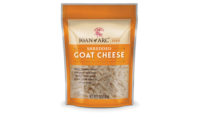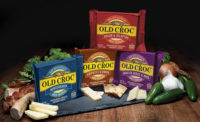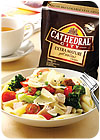
County Cornwall, in the southwestern part of England is famous for its rolling hills, its rustic seascapes, and its milk and cream. The small town of Davidstow is also known for its cheese production. Just outside the town there is a brand new cheese plant on a site which has hosted commercial cheesemaking since 1950. Over the years, the original facility underwent a number of small expansions, and as the new millennium approached, it consisted of a number of separate buildings of varying age.
By 2001, with sales of its Cathedral City brand of natural cheese growing significantly, the plant's owner, Dairy Crest decided that a plant of roughly twice the size was needed. And it didn't take long to determine that it would be best to start from the ground up and build a completely new facility.
"Dairy Crest recognized in 2001 that it needed to spend significant sums at Davidstow in order to sustain the plant's capacity of about 33,000 tons and the successful business it has built around the cheese produced at Davidstow," said Alan Wren, the facility's gen. mgr. "However, rather than undertake a program of renewing the main elements of the plant over time, we proposed to construct a new cheese plant alongside the old, with much enlarged capacity. The expanded plant would be capable of producing 55,000 tons of cheese per annum, making it the largest Cheddar plant in Europe and capable of producing, at increasing growth rates, high quality and added value premium cheese."
It's a highly automated, streamlined plant similar in technology, if not size, to some of the newest cheese facilities in the U.S. Tetra Pak was the main equipment supplier for the project, which began in 2003 and took about 18 months to complete, at a cost of about £55 million ($104 million U.S.).
Ramping down production from the existing facility and ramping up production on the new one was one of the most interesting challenges presented by the project, says Plant Mgr. Chris Terrett. And all the while, maintaining the character and quality of Dairy Crest's Cathedral City and Davidstow branded cheese was still job No. 1.
"We had to continue manufacturing cheese as we were doing this. We did not shut down," Terrett toldDairy Foodsduring a plant visit in March. "The Cheddar that comes from Davidstow is unique-it's very creamy and smooth, and the Cathedral City brand, which is the top brand of Cheddar in the U.K., represents about 50% of our total production. Any cheesemaker will tell you that even in the most modern cheesemaking facility there are certain unique bacteria in the cheese room that make some contribution to the character of the cheese." And duplicating that in a different facility can be difficult, but it was paramount, Terrett said.
"What we were after was the same product but a more consistent product," he said.
To get that, Dairy Crest constructed the new plant, and once it was commissioned, it ran alternating shifts with the old plant, cross training employees for the new equipment.
"We took a core team from the old site to the new site and then backfilled at the lower skilled jobs at the old site," Terrett said.
Quality Assurance benchmarked about 300 flavor aspect parameters and kept track of those on a spreadsheet until they were certain that the cheese from the new plant was truly the same as the cheese from the old plant.
"We started the trials on the new line in January of 2004 and by May we switched the old plant off," he said. The whey plant was commissioned two months later.

Davidstow was outfitted with an integrated system featuring a Tetra Tebel Alfomatic Cheddaring unit.
Local dairy tradition
Cornwall is known for its rugged, rural scenery. It stretches from the middle to the tip of England's West Country peninsula, and is bathed by Atlantic winds and blessed with ample rainfall. The climate is ideal for growing lush, nutritious pasture. For centuries, dairying, sheep farming (primarily for mutton) and fishing were important elements of the local economy. Cornwall's dairy industry is best known for its Cornish clotted cream. While mutton production was seriously curtailed after recent battles with hoof and mouth disease, small dairy farms have survived. Milk is brought to the Davidstow facility from 400 farms within a radius of about 70 miles. About 60% of that comes from County Cornwall, while most of the remainder comes from neighboring Devon. The plant receives 1 to 1.2 million liters (around 270,000 gal) daily, and there is a seasonal supply variability of about 10%."Cornish milk has an excellent quality, and it's an advantage to make cheese from Cornish Milk," Terrett said. "Some of our cheeses are made with only Cornish milk."
Milk is delivered to the plant via one of four double bays. The plant has storage capacity for 2.8 million liters.
From the silos, the milk enters the processing room for pasteurization. The two pasteurizers have a capacity of 2 x 85 000 l/h. Due to the high flow rate, each pasteurizer is divided into two Tetra Plex plate heat exchangers. The milk is pasteurized at 73 degrees C for 15 to 25 seconds, then cooled to 32 degrees before it is pumped to the vats.
A portion of the milk is separated in order to get skim milk for fat standardization. The surplus cream is pasteurized and delivered to other Dairy Crest plants.
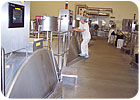
All cheesemaking functions including 11 horizontal vats, and the Cheddaring unit are controlled by one operator.
Central cheese hall
Cheese making is performed in the center of the new building. At the heart of the operation is the Tetra Tebel Alfomatic, flanked by eleven horizontal Tetra Tebel OST V cheese making vats at one end of the hall, and six Tetra Tebel Blockformer TwinVac at the other. The milk to finished cheese block process is one semi-continuous sequence. A single operator monitors most all of the cheesemaking and curding operations from one deck that spans the vats and the Alfomatic.Each Tetra Tebel OST vat holds up to 33,000 liters. During stirring, freeze-dried starter is added through the manhole or bulk starter injected in line and rennet is automatically sprayed into the tank. After coagulation, the cutting tools-mounted on the horizontal shaft-rotate in opposite directions to enable optimum cutting by the sharp knives.
The cheese making sequences in the Tetra Tebel OST vats are controlled by a recipe via the control panel. Manual operations are limited to adding the starter and checking the coagulum before cutting begins.
After stirring and heating, the curd is ready for Cheddaring in the Tetra Tebel Alfomatic. In this machine, the curd/whey mixture enters from the top onto a perforated screen, where most of the whey is separated off. The curd falls onto a slowly moving perforated plastic conveyor belt. Stirrers assist in further draining of the curd. Side guides control the width of the curd mat on each conveyor.
At the end of the first conveyor belt, the curd falls onto the second conveyor. The curd now starts to mat and fuse. When transferred to the third conveyor, the curd is stretched and turned upside down, and Cheddaring takes place. When it leaves the third conveyor, the curd is milled to pieces of uniform size, which fall onto the salting conveyor. On this conveyor, dry salt is added in order to reach the desired concentration. The salt and chips are efficiently mixed in a rotating mixing drum before being conveyed to the fourth conveyor belt. On the last conveyor belt the pieces are mellowed. Stirrers are applied to prevent further fusing. From the fourth belt, the curd pieces fall into a curd distribution tank for removal via vacuum-suction to the blockforming towers.

Cathedral City Cheddar, one of Dairy Crest's most important product lines is produced only at Davidstow.
Blockforming, storage and grading
Producing well-formed uniform blocks has long been a critical problem for cheddar cheese producers. The Tetra Tebel Blockformer TwinVac solves this production bottleneck by utilizing a simple system of vacuum treatment and gravity feed. The units in Davidstow are of the TwinVac type with two vacuum levels for higher capacity.The curd pieces are sucked from the curd distribution tank at the Cheddaring machine to the top of the 25 ft-high blockformer towers. By vacuum and gravity, the curds are pressed into a homogenous cheese column, free from whey and air.
At the bottom of the column, a knife assembly cuts off cheese blocks of even size and weight every 45 seconds. The 20 kg (44 lb) cheese blocks are pushed into plastic bags and transported on a conveyor to a scale and then to a bag vacuum device and sealer.
The cheese is now ready for maturing in storage.
The wrapped blocks are placed on trays in an Oldenberg chiller for 16 hours to reduce the core temperature. Once they have finished they are sent to one of two automated pallatizers.
"Every 51st block is placed on a separate pallet and we have a grader come in and grade the cheese at three, eight, and 13 months," Terrett says.
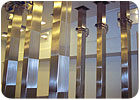
Six vacuum driven block formers feed automatic baggers. Blocks are then fed on two conveyors through shrink tunnels and metal detectors.
Whey treatment
This huge cheese creamery generates large quantities of whey. Two separate systems - one for sweet whey and one for salt whey - are used in order to optimally utilize this by-product's nutritional value.The stream of sweet whey comes from the Tetra Tebel Alfomatic whey screen and the collecting plates under the first, second and third conveyors. The collected sweet whey is being clarified in two parallel Tetra Centri 918 clarifiers, each with a capacity of 70,000 liters per hour. The recovered fines are brought back to the first conveyor belt in the Tetra Tebel Alfomatic, with no loss of curd in the whey.
After buffer storage, the whey cream is separated in two Tetra Centri whey cream separators and then pasteurized before being delivered to other Dairy Crest creameries. The "fines and fat-free" whey is stored before being evaporated and sold as a valuable whey concentrate to other food industries.
The salted whey, collected from the mixing drum and from the mellowing conveyor, passes through a nanofiltration plant after separation in order to be desalted before remixing with the sweet whey for evaporation.
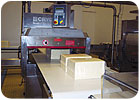
Six vacuum driven block formers feed automatic baggers. Blocks are then fed on two conveyors through shrink tunnels and metal detectors.
Complete control
Running a complex processing plant like the Davidstow creamery requires a sophisticated computerized system such as the Tetra PlantMaster.With the system's built-in logical sequences, the operator in the central control room has full control of every aspect. All valves are automatic and each remote controlled valve is capped with a ThinkTop unit for both actuation and feedback.
The operator's job mainly consists of choosing recipes and quantities for the cheese types to be produced, selecting quantities for tanks, and designating which tanks are to be used, etc. The process control system manages all the details. If the operator has selected a tank that is not available, he will be alerted.
Having control of all the details makes it possible to write reports and subsequently trace the production parameters for a specific piece of cheese-a widely requested function in today's European food production.
Another function in the Tetra PlantMaster system is the possibility for the Tetra Pak technical service team to check the status and service intervals of each component on line from its own office.
The plant is designed for 19 hours production a day, which means five hours for cleaning. However, the plant does not shut down completely during this period. Some of the cleaning is also performed during daily production time. The cheese making vats are also cleaned during ongoing production.
Cleaning is carried out by five central CIP units. Each unit is dimensioned for its specific task.
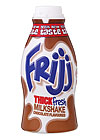
Davidstow produces only cheese, but among Dairy Crest's product lines are spreads and fresh dairy, including Frijj, the UK's No. 1 flavored milk line.
Maintenance included
An agreement has also been signed that gives Dairy Crest and Tetra Pak Processing a 50/50 share of the savings Dairy Crest makes on service costs from year two.The concept called Tetra Pak PlantCare offers customers a preventative maintenance service on individual pieces of equipment, whole lines or complete plants which increases up-time and reduces overall maintenance costs.
This contract allows Tetra Pak Processing to plan the maintenance schedules together with Dairy Crest maintenance staff and to set up spare parts stock on site; the maintenance will be performed by joint teams.
The maintenance agreement covers all cheesemaking and milk processing equipment as well as valves, pumps, instrumentation, the Tetra Plantmaster system and a 24-hour service call coverage.

Davidstow produces only cheese, but among Dairy Crest's product lines are spreads and fresh dairy, including Frijj, the UK's No. 1 flavored milk line.
Good teamwork
Building a greenfield plant like this requires experience and technical competence. Knowing the secret of cheese making is another important prerequisite. The cooperation between Dairy Crest and Tetra Pak staff at all levels and across many functions has been important. "The key to the success of this two year project has been investment and collaboration," says Brian Eddy, Dairy Crest's gen. mgr. for cheese business projects. "The biggest improvement the UK cheese industry has ever seen is now completed."Teamwork is an important part of the daily production work at the plant, too, Terrett says.
There are about 110 employees on site, working 12-hour shifts. All are full time permanent employees. There are also about 50 transport workers who collect raw milk and deliver product to a central distribution center.
"We've spent three years putting in this new kit and the focus now is working with the people," Terrett says. "We have lots of initiatives to get performance and production up. We have re-graded jobs and we are recognizing people with bonuses."
Dairy Crest has already won a number of quality prizes for its Cathedral City and Davidstow Cheddar cheese. Dairy Crest is now prepared to continue its winning cheesemaking tradition at the Davidstow plant for many years to come.
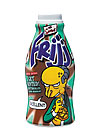
Sidebar: Dairy Crest's Holdings and Brands Continue to Grow
Dairy Crest is the UK's leading chilled dairy foods company and one of the ten largest food companies in Britain. It began as the milk processing operation of Britain's Milk Marketing Board, and became a separate company in 1987.Since the 1995 acquisition of Mendip Foods Ltd., and its Cathedral City brand, Dairy Crest is the leading supplier of mature cheddar in the UK. It is also a major player in spreads and in milk.
Dairy Crest has continued to grow through acquisition, having purchased minority interests to become the sole owner of the Country Life butter brand.
In May of 2005 Dairy Crest acquired both Starcross Foods, a modern fresh milk processing facility in Derbyshire, and the dairy business and assets from the Midlands Cooperative Society. Earlier this year Dairy Crest purchased Express Dairies from Arla Foods.
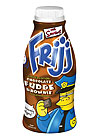
Dairy Crest's product portfolio includes not only the Cathedral City and Davidstow cheese brands, but Wexford and Hartington brands and the Over the Moon collection of specialty cheeses.
Spreads brands include Clover, Utterly Butterly, Country Life and St Ivel Gold.
Dairy Crest also boast of having had the top flavored milk brand since the introduction of FRijj in 1993. The FRijj brand includes standard flavors, plus seasonal and limited editions that started with a Spooky Halloween Toffee and include the Simpsons range, with flavor themes tied to characters of the popular (in Britain as well as the United States) animated TV comedy.
Until quite recently, (see news item p. 17) the company manufactured private label cheese for some of the UK's largest retailers including Asda and Morrisons. It is also the sole supplier of yogurts and milk drinks to Waitrose and Marks & Spencer.
Dairy Crest Vendors
Cheesemaking equipment:Tetra PakWhey equipment:Niro
Control system:Honeywell
Packaging equipment:Cryovac
Cultures:Chr. Hansen, DSM, Dansico
Labeling equipment:Markham
Metal detection:Fortress
Block chilling:Oldenberg
Effluent plant:Wherle

